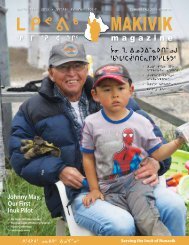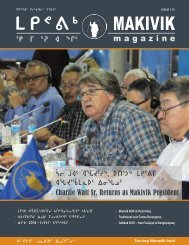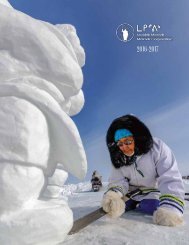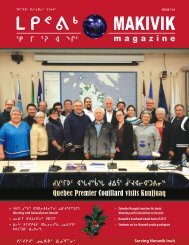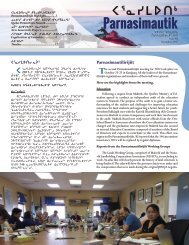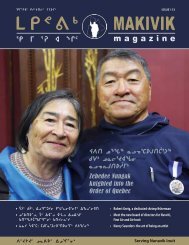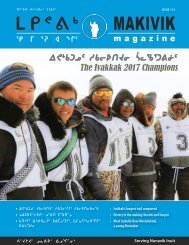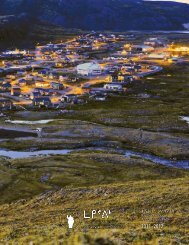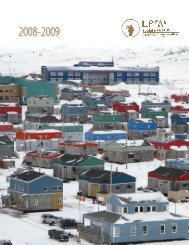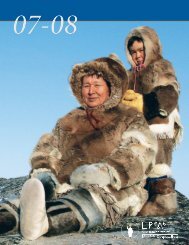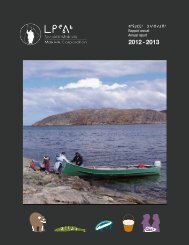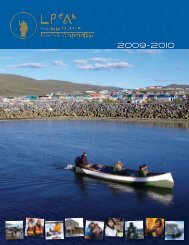2013-2014 Makivik Annual Report
The 2014 Makivik Annual Report
The 2014 Makivik Annual Report
Create successful ePaper yourself
Turn your PDF publications into a flip-book with our unique Google optimized e-Paper software.
©STAS OLPINSKI<br />
ᓇᓐᓄᓇᓱᑉᐸᑕᖏᑕ ᐅᓄᕐᓂᖏᑦ ᐃᑭᓕᒋᐊᕐᑕᐅᑎᓪᓗᒋᑦ ᓯᑕᒪᓄᑦ ᓇᓄᕐᓄ ᐊᕐᕌᒍᑎᓕᒫᒥ ᓇᓐᓄᒍᓐᓇᓂᕋᕐᑕᐅᓕᕐᑐᑦ 22-ᓂᒃ), ᑕᒪᓐᓇ<br />
ᑌᒣᑦᑐᒧᑦ ᑎᑭᐅᑎᓂᖓᑦ ᑲᔪᓯᑦᓯᐊᓂᖃᓚᐅᔪᔪᖅ ᐊᓯᒥ ᓇᓄᕐᓂᐊᐸᑦᑐᑦ ᐃᑭᓕᒋᐊᕐᑕᐅᔨᐊᖃᕐᓂᖏᑕ ᓴᓂᐊᓐᓂ. ᑖᒃᑯᐊ ᑐᑭᑖᕈᑏᑦ<br />
ᐊᖏᕐᑕᐅᓂᖃᓚᐅᔪᕗᑦ ᐊᕐᕌᒍᓐᓂ ᒪᕐᕉᓂ ᐃᓱᒪᕐᓱᓗᑎᒃ ᐊᖏᖃᑎᒌᒍᑎᐅᒪᓚᖓᓕᕐᓱᑎᒃ ᓇᓐᓄᓇᓱᑉᐸᑐᑦ ᐊᑯᕐᖓᓂ ᑎᑭᓪᓗᒍ 2016.<br />
Canada including hunters from Kuujjuaraapik, Umiujaq, and Inukjuak<br />
as well as their counterparts from Sanikiluaq, Québec Cree, Ontario<br />
Cree plus various levels of government. The goal of the meeting<br />
was to reassess the total number of bears that could be sustainably<br />
harvested from the South Hudson Bay polar bear subpopulation<br />
(shared between Nunavik, Nunavut, Québec, and Ontario) and<br />
equitably allocate the number of bears between Native hunters<br />
from the various jurisdictions. By lowering the overall annual harvest<br />
from approximately 60 bears to 45 bears (the number arrived at by<br />
the end of the meeting) the hunters were able to avoid a situation<br />
whereby the export of skins and other parts of South Hudson Bay<br />
polar bears would be prohibited, meaning that important economic<br />
benefits derived from the sale of polar bear skins would be lost to<br />
the affected communities. Although the <strong>Makivik</strong> representatives<br />
at the meeting were not pleased with the prospect of further limiting<br />
Inuit harvesting of polar bears, it was felt that the outcome, (a<br />
decrease in allocation to Nunavik hunters of four bears to 22 bears<br />
per year), was a success given reductions that other user groups<br />
made. This decision was ratified in the form of a two-year voluntary<br />
agreement between the users terminating in 2016.<br />
de représentants des Cris du Québec, de Sanikiluaq et des trois<br />
communautés du Nunavik. Les représentants de <strong>Makivik</strong> ont fait<br />
valoir qu’il existe une grande incertitude scientifique concernant<br />
l’estimation de la population, mais que les Nunavimmiut croient<br />
qu’il y a plus d’ours que jamais. Pour cette raison, <strong>Makivik</strong> estime<br />
que la PAT devrait être supérieure à celle recommandée par les<br />
scientifiques.<br />
Le vice-président de <strong>Makivik</strong>, Adamie Delisle Alaku, Stas<br />
Olpinski et Gregor Gilbert ont assisté à une réunion organisée par<br />
Environnement Canada comprenant des chasseurs de Kuujjuaraapik,<br />
d’Umiujaq, d’Inukjuak et de Sanikiluaq, et des représentants des Cris<br />
du Québec, des Cris de l’Ontario et de divers paliers de gouvernement.<br />
La réunion avait pour but de réévaluer le nombre total d’ours<br />
pouvant être récoltés de manière durable dans la sous-population<br />
du sud de la baie d’Hudson (partagée par le Nunavik, le Nunavut, le<br />
Québec et l’Ontario), et de répartir équitablement le nombre d’ours<br />
entre les chasseurs autochtones des provinces et territoires visés. En<br />
abaissant la récolte annuelle d’environ 60 à 45 ours (le nombre fixé<br />
lors de la réunion), les chasseurs ont pu éviter que l’exportation de<br />
peaux et d’autres parties des ours du sud de la baie d’Hudson soit<br />
interdite, ce qui entrainerait des impacts économiques importants<br />
pour les communautés touchées. Bien que les représentants de<br />
<strong>Makivik</strong> aient été déçus de limiter la récolte d’ours blancs par les<br />
Inuits du Nunavik, le résultat, (une diminution de quatre ours pour un<br />
total de 22 ours par année) est considéré comme un succès compte<br />
tenu des réductions acceptées par d’autres groupes d’utilisateurs.<br />
Cette décision a été ratifiée sous la forme d’un accord volontaire<br />
de deux ans se terminant en 2016.<br />
120<br />
ᒪᑭᕝᕕᒃ • <strong>Makivik</strong> Corporation • Société <strong>Makivik</strong>






